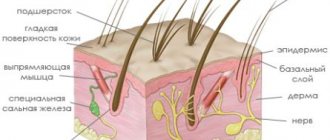Cats require careful care, however, you must follow the rules of bathing and their frequency. You should know that if water gets into your cat’s ear, you need to immediately remove it yourself or consult a doctor. The hearing system of cats is very sensitive and water entering deep into the auricle leads to inflammatory processes and otitis media, which can cause hearing loss in the animal.
How to avoid getting water
Don't get carried away with water treatments for your pets. However, if such a need arises, then bathing should be done very carefully. There is no need to direct the stream of water directly at your head, just wipe it off. It won't hurt to insert cotton swabs into your ears.
Expert opinion
Irgutanova Nina Nikolaevna
Practicing veterinarian, 13 years of experience.
Getting water into your ears can lead to, although not fatal, quite unpleasant consequences.
It is better to bathe cats less often. But if trouble does occur, then without panic, do everything to help the pet. If you lack confidence in your capabilities, it is better to turn to professionals.
Prevention measures
To avoid unnecessary problems and protect your pet from health problems, you should take care in advance to prevent water from getting into his hearing organs. When bathing, you should try not to wet the animal's head completely. For hygienic purposes, it will be enough to simply wipe the cat's face and the area between the ears with a damp cloth.
A good preventive effect is achieved by placing cotton swabs in the ears, pre-treated in vegetable oil or Vaseline. Once the water procedures are completed, it will be enough to simply pull out the swab and wipe the surface of the auricle with a dry cloth.
Why cats shouldn't get their ears wet
Veterinarians do not recommend washing pets more than 1-2 times a month. There are weighty arguments for this assertion.
Cats have a special layer of fat on their skin that protects them, but when bathing it is washed off.
The animal experiences a state of discomfort. If a situation arises in which cleaning a cat is necessary, you should follow the rules so as not to harm your pet. To do this, you need to wash the animal not completely, but certain areas of the body: tail, torso, paws, head, avoiding the area around the ears and eyes.
The most basic rule when bathing cats is that water should not get into the ears.
The reason for such subtleties in bathing lies in the structural features of the hearing aid of furry cats; it is very sensitive and susceptible to diseases. Cats' ears have a complex constitution; if liquid gets inside the auricle, it will not be able to pour back out.
Remaining water gives impetus to inflammatory processes. This leads to a disease such as otitis media.
It is very difficult for cats to tolerate painful conditions.
Inflammatory diseases of the hearing aid are dangerous to the health of pets due to their proximity to the brain. As a result of improper bathing, the kitten may remain deaf.
Examination of the animal's ears
What should alert you when examining a cat’s ears:
- First, the inside of the cat's ear should be warm, clean and slightly oily.
- If the sulfur inside has darkened and acquired a rich rusty-brown color, and before this the cat vomited or had purulent-bloody discharge from the nose, there is a reason to consult a doctor. Perhaps the animal becomes anemic and urgently needs iron supplements.
- A similar picture is observed in kittens if they have polyps (adenoids) in their nose. Polyps can grow directly in the ear canal!
- This is most likely impossible without surgical intervention.
- If sulfur has acquired a dull yellow color and is released (flowing) profusely from the ear opening, then there is clearly a purulent process. The presence of white or greenish clots is confirmation of this.
- Fever, refusal to feed, lethargy are accompanying symptoms of otitis media.
Let's run to the doctor! We urgently need antibiotics or antiviral drugs!
If black inclusions are noticed in the earwax once, then there is no need to worry - most likely, dirt has gotten into the ear. It is enough to clean the auricle with a cotton swab or disk. If there are no small inflamed areas under the dirt, and the ear canal itself is clean, then there is no reason to panic.
It’s another matter if, after wiping, “dirt” appears again and again, its boundaries expand, the delicate inner lining of the ear becomes inflamed, and the wax on the tampon spreads out in dirty, bloody stains - a bad sign. This could be otomycosis, because. Fungal spores can turn sulfur black. Presence of blood - ear mite - Otodectes cynotis (lat.). And this is the beginning of ear frequency.
Symptoms are noticeable even without earwax:
- increasing itching;
- bowed head, etc.
Attempts to scratch the ear result in additional damage, which does not add a good mood to the unfortunate animal; it becomes nervous and aggressive. The temperature may rise.
Most often, the disease manifests itself in small kittens and the danger accompanies up to a year.
Why is a visit to the doctor necessary? Because under a microscope he will be able to determine what is preventing the cat from living in peace - a fungus or a mite. Perhaps both together.
If the sulfur is completely colorless or has a milky white color, then this is also a reason to consult a veterinarian. Perhaps this is a sign that the cat’s body lacks microelements or hypovitaminosis begins.
This question should not be started, because... a young animal that does not receive these building materials during the growth period will never be able to feel absolutely healthy. The doctor (after tests) will prescribe the correct treatment.
The combination of clear exudate from the ears, nose and eyes at the same time is an allergic reaction.
A dry ear from the inside, covered with wax, flaking off with whitish scales, like large dandruff, is a sign of a lack of fat in the cat's food or the beginning of dermatitis.
The doctor will make an accurate diagnosis. He will determine, after a detailed examination, whether the constant discharge from the ear is an internal birth injury in the kitten or a deep inflammatory process.
When examining your cat's ear, don't be shy to smell it! Smell can say a lot! For example, with a staph infection, an unpleasant fishy odor will emanate from the ear. The smell of rotten meat will indicate suppuration, although this may not yet be visible outwardly.
A sharp, pungent odor can appear from the ears of cats during the period of “maturation” or sexual heat. A sharp and unpleasant odor may also indicate a thyroid disease.
Attention! The appearance of ichor or drops of blood from a cat’s ears is an ear injury with damage (worse if ruptured) to the eardrum! Go to the veterinary clinic immediately!
My cat got water in her ear: what can I do to help her?
Cats are wonderful and sweet pets that require regular and attentive care. Sometimes situations arise when the furry owner does not know how to help or what to do. It will be useful for every cat owner to know what to do if water gets into the cat's ear.
What happens if water gets into a cat's ear? Most people believe that if this happens, then the animal is in mortal danger. Is it really?
Water itself does not pose any threat to cats. But a cat's ears are still their weak point.
Therefore, certain consequences are possible, sometimes very negative. Therefore, the owner needs to treat what happened with attention and due care.
The reason is that the auditory system of cats is very intricate.
The cat's hearing organs are a real impenetrable labyrinth with many turns and passages. And if water gets deep into the ears, it can flow so far that there is no way for it to come out.
If you are concerned about the consequences of water getting into your pet's ear, there is no need to panic.
The situation should be analyzed, and in case of slight penetration of liquid, independent measures should be taken.
You need to act carefully, do not use the cotton swab too actively and deeply, otherwise there will be only harm. If you doubt your abilities, it is better to immediately go to the veterinarian. A professional will do everything as needed.
If the fluid drops to the middle ear, then this is fraught with inflammation (otitis, for example).
This is very dangerous for cats and can cause hearing loss, and if not treated properly, the inflammation can spread and cause death. But it is worth mentioning that the likelihood of death can only be in the most advanced, extreme case.
So, water got into your cat’s ear, what should you do? First of all, you need to calm down and the object.
Ear cleaning
Since you can't wash your cat's ears, you need to clean them from time to time to avoid wax buildup and plugs.
To do this, the owner will need a cotton swab and a special gel, which can be purchased at a pet store (if this is not available, the use of ordinary vegetable oil is allowed).
Carefully turn your pet's ear out so as to provide maximum access to the ear canal. Then, using a stick, smoothly moving outward, clear the ear of wax, fluid, and various types of discharge.
At the end of the procedure, carefully wipe the cat's ears with a clean and dry cloth. Such cleaning will be very useful not only for hygienic purposes, but also for the prevention of ear mites, otitis, and inflammation.
Complications
Due to the anatomical structure, when water enters a cat’s ear, it cannot flow back out on its own. Therefore, penetration of liquid can lead to inflammatory diseases, depending on the depth of water penetration.
Expert opinion
Kalado Irina Sergeevna
Practicing veterinarian, 13 years of experience.
The flow of water into the middle ear threatens the development of otitis media; if the water flows further, the condition may be complicated by tubotitis and even the development of deafness.
If you do not pay attention to this, the developed disease will lead to purulent processes in the ear and even lead to the death of the animal.
Treatment
Treatment of inflammatory ear diseases includes:
- antibacterial, antiviral agents of local and general action;
- antipyretics, analgesics;
- physiotherapy;
- in some cases - surgical intervention.
Treatment must be based on accurate diagnosis, which is impossible outside a specialized clinic. The high professionalism of CELT specialists allows us to identify various diseases of the hearing organ and choose the most effective means of solving the problem.
Make an appointment through the application or by calling +7 +7 We work every day:
- Monday—Friday: 8.00—20.00
- Saturday: 8.00–18.00
- Sunday is a day off
The nearest metro and MCC stations to the clinic:
- Highway of Enthusiasts or Perovo
- Partisan
- Enthusiast Highway
Driving directions
In what cases should you contact a veterinarian?
You should immediately seek the help of a specialist:
- If there is pus flowing from your pet's ears.
- The animal's ears become red and hot, and the pet constantly tilts its head towards the affected ear.
- If your dog's ear is leaking black or flaky fluid. This may indicate that your pet has picked up an ear mite, and it is difficult to deal with it at home.
- If the dog is restless, it constantly scratches its ear or scratches the skin behind the ear until it bleeds.
What you should not use to clean your animal’s ears at home:
- Hydrogen peroxide.
- Vodka or any other alcohol solutions.
- Any oil.
- Zelenka.
Diagnostics
The diagnosis and treatment of pathologies associated with this symptom is carried out by an ENT doctor (otorhinolaryngologist) or an audiologist (a narrower specialty in otorhinolaryngology). During the appointment, the specialist talks with the patient, examines him, conducts the necessary examination, and establishes a diagnosis.
The multidisciplinary CELT clinic employs experienced, highly qualified otolaryngologists. Rich clinical experience helps them make the correct diagnosis in the most difficult cases.
How to understand that a cat needs help
Unfortunately, it is not always possible to understand that water has gotten into the cat’s ears, especially since the animal cannot complain about the discomfort.
Therefore, after bathing a cat and performing water procedures, veterinary specialists strongly recommend that owners pay attention to alarming symptoms:
- restless and anxious behavior;
- constant licking and attempts to scratch the ears with paws;
- constant meowing;
- frequent shaking of the head;
- permanent lack of appetite;
- lethargy and apathy;
- pinching ears;
- the appearance of specific discharge, possibly with purulent impurities;
- pain when touching the auditory organs (the cat begins to struggle, hiss, meow pitifully, or simply hide).
If such signs appear, it is necessary to urgently provide first aid to your pet, without waiting for the development of complications and the addition of dangerous concomitant diseases.
Next
CareWash your kitten for fleas










